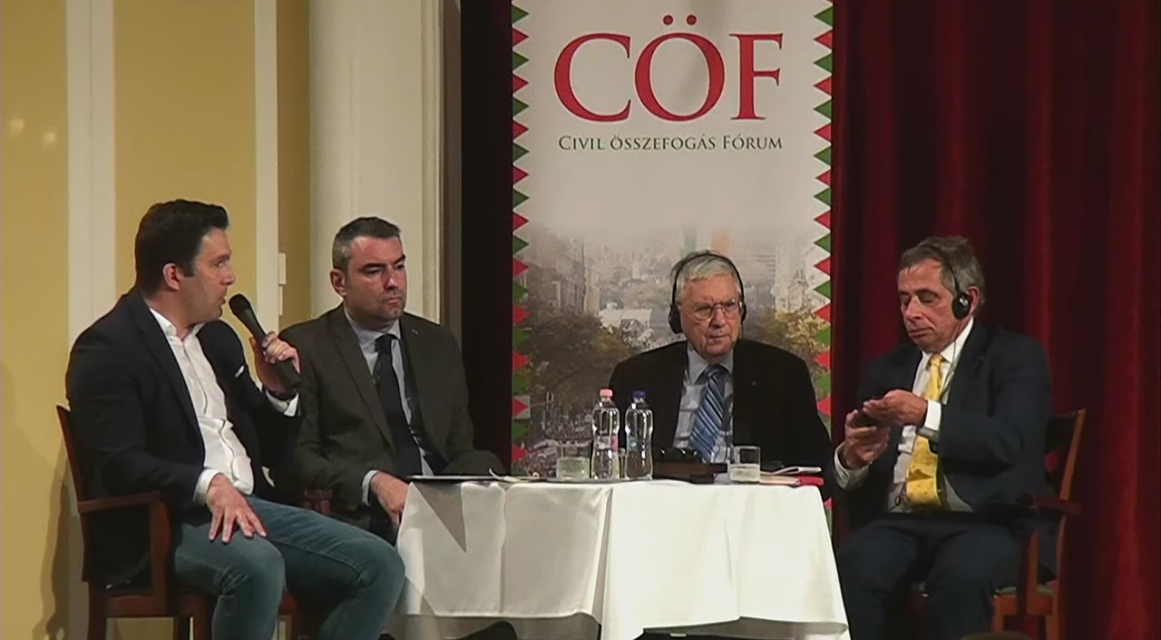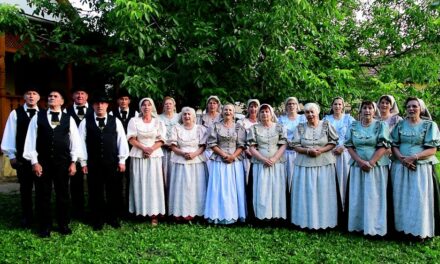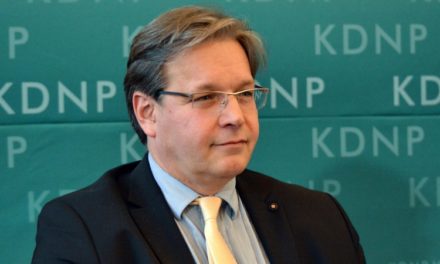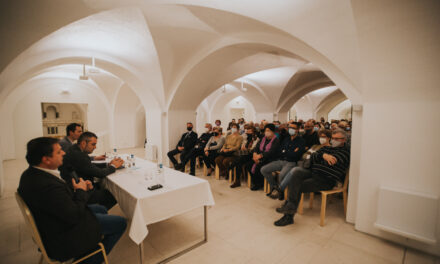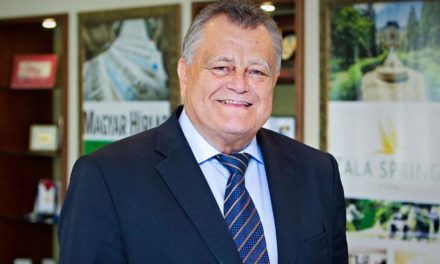"Civic Power of Europe - Citizens of the European Union". With this title, a discussion was announced in the lecture series of the Civil Academy, and the current event was also special. In addition to the Hungarian speakers - economist Lóránt Károly, member of the C12 expert group and constitutional lawyer Zoltán Lomnici Jr., spokesperson for CÖF-CÖKA - a foreign guest joined the thinkers on the role and possibilities of civilians: Henri Malosse, honorary president of Vocal Europe, the European Union Former chairman of its Social and Economic Committee.
As an introduction to the evening, László Csizmadia, the founding president of CÖF-CÖKA, greeted the participants and indicated that the event was the first stop in a series of 3 events. The aim of the discussions is to outline the path that is worth and necessary to take so that the will of real citizens, not Soros-NGOs, dictates the European Union. The new Peace March organized for March 15 will also be an important event in the path of normality, but the most important thing is that the anti-national, left-liberal forces can be swept away in the April 3 election.
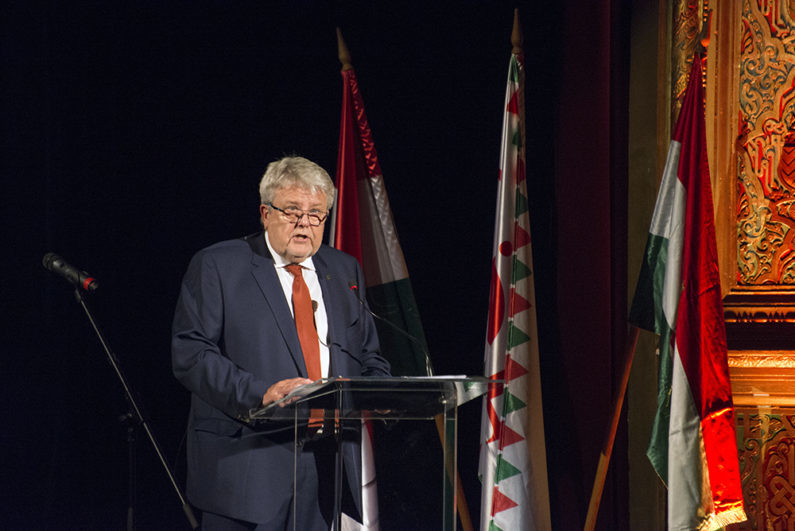
László Csizmadia
The European Commission called on the citizens of the member states to give their opinion on the present and future of Europe. Hungary therefore summarized the opinions of civilians at several conferences, our country is very active in this work, we are in 1st or 2nd place. At the same time, we are skeptical that the Commission is really interested in what EU citizens want, since the fate of more than 50 citizens' initiatives so far proves the opposite. It is good if 4-5 cases were accepted and only 1-2 cases resulted in a decision from the initiative. But despite everything, we have to say our opinion, because those who are silent will certainly not be heard.
László Csizmadia emphasized that 14 EU countries were already represented at the 3rd Congress of the EU-CET, an international NGO born on a Polish-Hungarian initiative, and the organization's 5-member committee was able to be formed. On the Hungarian side, its member László Csizmadia is jr. Zoltán Lomnici , spokesperson of CÖF-CÖKA. It is a particular pleasure that not only politicians and private individuals, but also Christian trade unions have joined the EU-CET. The 3rd conference ended with the issuing of a closing statement, in which the representatives of the 14 participating organizations stated that they would like to serve the interests of European citizens in cooperation with the EU, but rejecting the centralizing efforts of the current leadership.
It is also part of the declaration that the role of civil initiatives must be strengthened in the EU, the current methods of stealth legislation must be rejected, Europe's borders must be protected, and a realistic climate protection and nature protection system must be established, in which nuclear energy plays a major role. Finally, László Csizmadia identified the protection of European Judeo-Christian values and the protection of our children and grandchildren against LGBTQ propaganda as goals.
War atmosphere
Of course, the daily events were discussed first. Regarding the Russian-Ukrainian conflict, Henri Malosse expressed the opinion that civilians, but also the Union, could play a major role in settling the situation. Even during the Crimean conflict, it was possible to bring the parties to the negotiating table, and the Minsk agreement was reached. Unfortunately, we can no longer be satisfied with its compliance. On the one hand, in his opinion , Russia should not support the Russian separatists in Ukraine, and on the other hand, the Ukrainians should not severely restrict the rights of the minorities living in their territory - Russians, Hungarians, Romanians. You should not listen to the war mongers, because there is always a peaceful way. The point is that geopolitics should not dictate, but the interests of the people. This is II. After World War I succeeded, that is, today the two great enemies, Germany and France, are able to cooperate. The same must be achieved in Russian-Ukrainian relations.
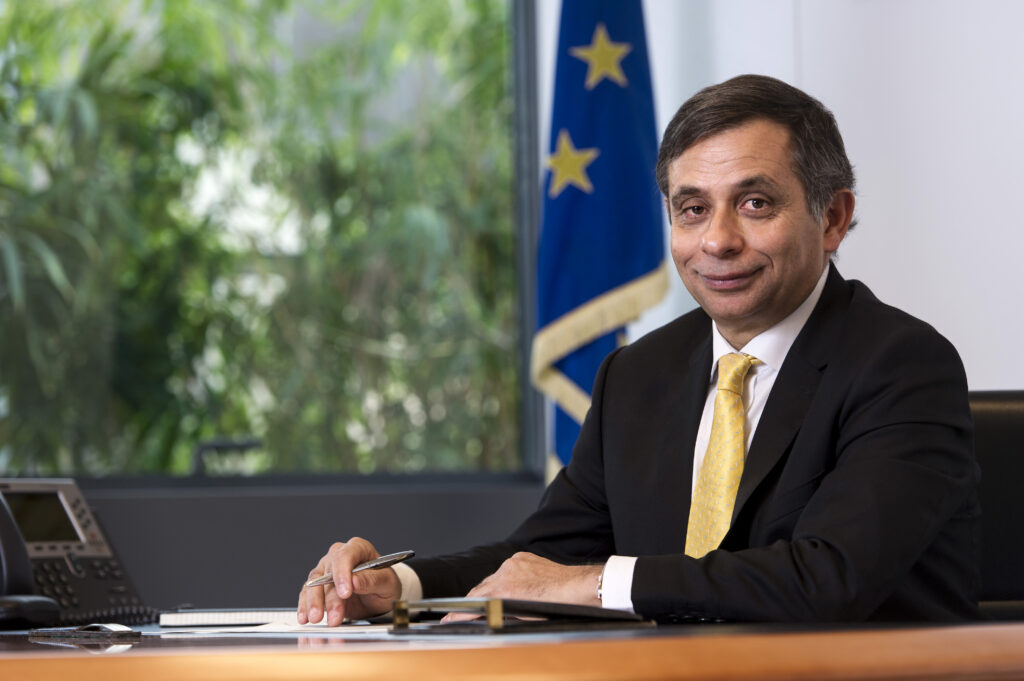
Henri Malosse ( photo: euractiv.com )
Károly Lóránt pointed out that the escalation of the conflict is in the interest of the USA. They would like there to be no cooperation between Russia and the EU. It's as if NATO's "motto" still lives today: keep America in, Germany out, and Russia down. Europe cannot let the USA dictate.
Jr. Zoltán Lomnici supplemented this with the fact that great statesmen such as Adenauer, Schumann or de Gaulle did not imagine the Union in this way. They thought in terms of strong nation-states, which collectively represent significant economic power, but retain their national character. Now we see that while China and India, for example, are growing rapidly, Europe is becoming weaker. The reason for this is the significant conflict between the leadership of the Union and several member states.
Before elections
We are facing important months, as elections are coming up in Hungary as well as in France. Mr. Malosse believes that a struggle between two forces is expected in France. One is Macron's globalist vision, the other is the patriotic approach. Two counter-candidates can also be considered, who, despite the slander against them, are not anti-Union, but both are patriots. This is necessary, because French cities are slowly becoming unlivable, Muslims are taking over, radical Muslims want to dictate. "And we are slowly losing our French identity. On the other hand, also European identity, because the bureaucrats in Brussels want to tell us what to do and what to think." The stakes of the French election are whether globalists or patriots will lead the country.
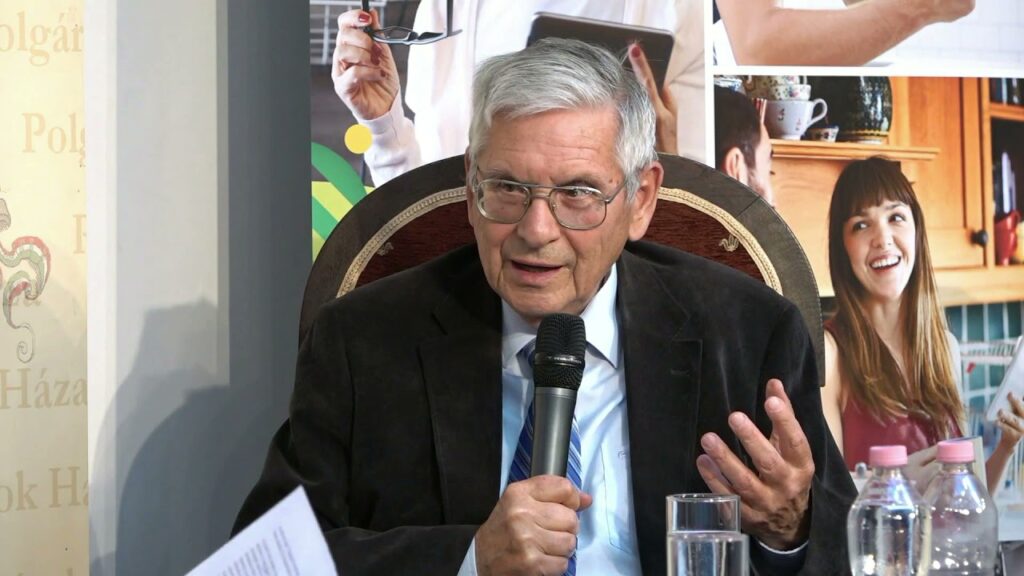
Károly Lóránt
Károly Lóránt, the Hungarian election - if the bourgeois side wins again - can, for example, serve other European countries as well. The national feeling is still strong in Central and Eastern European countries, and in order for it to remain so, the Viktor Orbán must win. Of course, the game is not over yet, no matter what the polls show. In order to win, everyone who supports the current government must also go to vote. Don't think that we are the only ones who represent normality in Europe. An EU research showed that 90 percent of people think in terms of a nation state and only 10 percent are globalists.
Jr. Zoltán Lomnici made a surprising statement, according to him, György Soros was right. Then two decades ago, he already wrote that time has passed for the state administration system and its organizations, and look, what do we see? The EU's centralization efforts do not encounter strong resistance, so the state administration is really weak. And the leaders are also weak. Gergely Karácsony for example , but it could be classified as: Olaf Scholz is gray and weak, about Biden (this is what they say in America) that his greatest merit is that he is still alive. György Soros likes such water eights , compared to them, Macron is particularly strong.
Henri Malosse respects the president's office and person, but Macron is not, to put it mildly, a "man of the people". You said in an interview that the most difficult thing for you was that you didn't know what French people were like. He is the one who was born with a silver spoon in his mouth, lived in a bubble, only had contact with the "upper circles". He doesn't know Europe either , he usually traveled in Africa and America, but he didn't interact with ordinary people. For him, the USA and Europe are the same and are only related to globalists. Or let's look at Ursula von der Leyen . He revealed the order of importance for him. First to meet Soros, second to meet the members of the V6, third to the Green Peace activists, the real civilians are the hundredth in line. Macron and Ursula are the same dog. We need leaders like Viktor Orbán.
Károly Lóránt supplemented this with the fact that although in the EP approx. There are 260 documented serial paid agents, but the situation is not rosy without them. The EU has shifted in the direction of cultural communism and they don't even have to pay for it. The generation of 68 gradually occupied the universities, they raised the generation of New Bolsheviks, who then occupied the courts, government agencies, the vacant social democratic parties and trade unions. If Soros doesn't fund them, they would still do it.
Henri Malosse claimed that we are in the majority, but the neoliberals are the loudest in the EU. NGOs are present in Brussels on a daily basis and create an atmosphere. Those who disagree with them are silent because they are afraid. The opposition is now being retaliated by the Brusselsites. That's why the EU-CET is a great initiative, because the voiced dissent can give courage to the silent majority, they can feel that they are not alone. It is therefore important to have a real civil presence in Brussels.
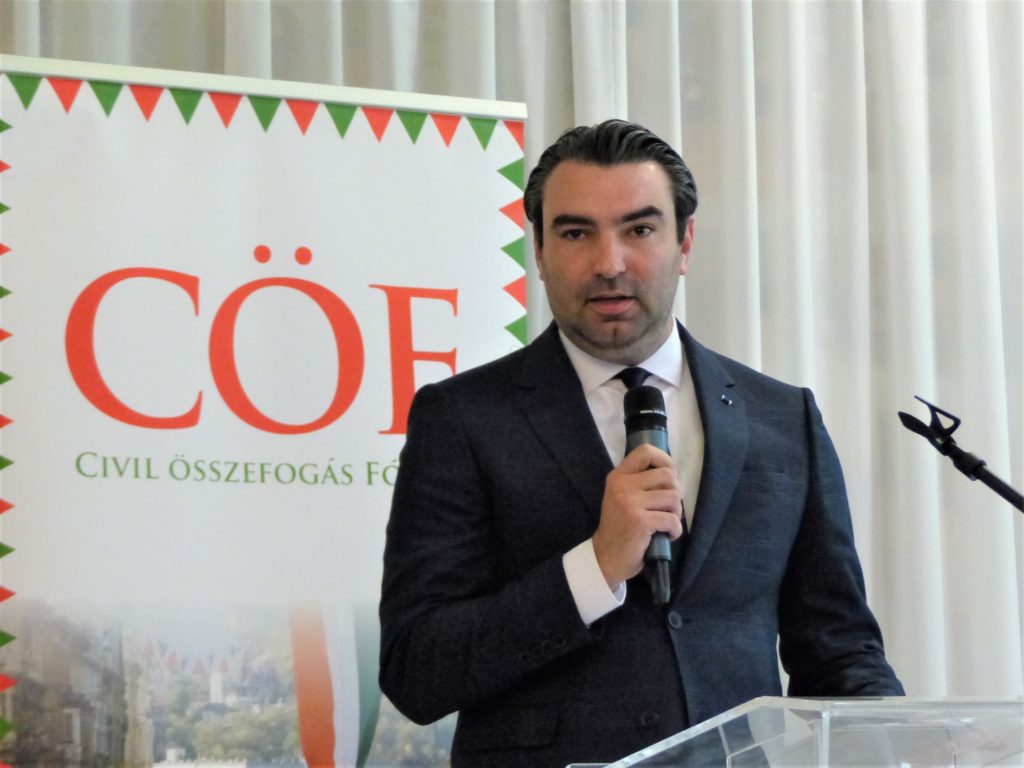
Jr. Zoltán Lomnici
Jr. Zoltán Lomnici gave examples from the field of law, indicating that Soros does not need to call a judge in order for the neo-Bolshevik ideology to prevail. The method is much more sophisticated. With scholarship programs and sensitizing courses, personal and ideological relationships are established, so the NGOs gain a strong influence, albeit indirectly.
There is hope?
Henri Malosse, it is. We have to achieve the strengthening of the influence of real civilians, we have to voice our opinion even if we are attacked by it. If national commitment wins in the Hungarian and French elections, this may influence the next EU vote as well. Otherwise, the European Union will be lost.
Károly Lóránt believed that the situation in Europe today is similar to the time of the Chinese Cultural Revolution and that the rhetoric used is also reminiscent of the 50s. But if we use the left-liberal concept to assert our own, patriotic concept, the Union can still be changed.
In closing, jr. Zoltán Lomnici explained: we should not allow labels to be attached to us, to call us xenophobic, homophobic, or racist. We have more than 1,000 years of history, legal system, and culture, let no one else serve as a model for us, let us be seen as an example to follow.

